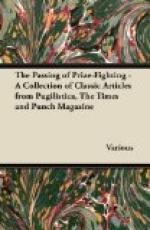[Illustration]
But in order to exhibit the capacities of this noble art in all their comprehensive excellence, it is requisite that we should, in the first place, say a few words on language in general.
It is commonly supposed that there are but two kinds of language among men—the written and the spoken: whereas it follows, from the very nature of language itself, that there must necessarily be as many modes of conveying our impressions to our fellow-creatures, as there are senses or modes of receiving impressions in them. Accordingly, there are five senses and five languages; to wit, the audible, the visible, the olfactory, the gustatory, and the sensitive. To the two first belong speech and literature. As illustrations of the third, or olfactory language, may be cited the presentation of a pinch of Prince’s Mixture to a stranger, or a bottle of “Bouquet du Roi” to a fair acquaintance; both of which are but forms of expressing to them nasally our respect. The nose, however, is an organ but little cultivated in man, and the language which appeals to it is, therefore, in a very imperfect state; not so the gustatory, or that which addresses itself to the palate. This, indeed, may be said to be imbibed with our mother’s milk. What words can speak affection to the child like elecampane—what language assures us of the remembrance of an absent friend like a brace of wood-cocks? Then who does not comprehend the eloquence of dinners? A rump steak, and bottle of old port, are not these to all guests the very emblems of esteem—and turtle, venison, and champagne, the unmistakeable types of respect? If the citizens of a particular town be desirous of expressing their profound admiration of the genius of a popular author, how can the sentiment be conveyed so fitly as in a public dinner? or if a candidate be anxious to convince the “free and independent electors” of a certain borough of his disinterested regard for the commonweal, what more persuasive language could he adopt than the general distribution of unlimited




